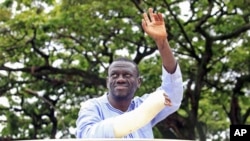A human rights group says the Ugandan government has a long history of cracking down on freedom of expression. Human Rights Watch [HRW] is reacting to the latest violence stemming from the demonstrations led by opposition figure Kizza Besigye.
“Obviously, we’re extremely worried about the situation recently in Uganda,” said Maria Burnett, HRW spokesperson in Kampala, who added, “The two main problems are consistent abuses by the security service, particularly using excessive force in the face of demonstrations and sometimes lethal force, and the issues surround freedom of expression.”
HRW said these include threats to radio stations and Internet use.
“A lot of fear within the radio stations and television stations that they need to be careful about what they say because [it] can have repercussions as a result of being too critical of government,” she said.
Buganda
“In 2009, there were demonstrations protesting government action trying to control the freedom of movement of the traditional royal leader of the Buganda people. It’s the largest ethnic group in Uganda. And people are quite loyal to him even though he doesn’t have an official political role,” she said.
She said within 48 hours of the demonstrations the police and military killed more than 40 people.
“We have called on the government numerous times to carry out investigations and to hold police and military, who used unnecessary lethal force at that time, accountable. And we have never seen follow-up action, despite some commitments here and there that there would be investigations,” she said.
Human Rights Watch said the government also shut down four radio stations that broadcast in the Buganda language, despite a lack of evidence of any wrongdoing.
2011
“Now, in the current situation,” said Burnett, “you start to see self-censorship on the part of radios, partially because people remember that one of those radio stations from 2009 was actually off air for over a year. So it’s obviously in the radio station’s best interest to be careful about how they report criticism of the government…so that they don’t end up losing their jobs and losing revenue from their businesses.”
Paying attention?
The current protests and violence in Uganda come at a time when much attention is being paid to Africa, with uprisings in the north and recent violence in Ivory Coast.
“Groups like mine always want more people to pay attention to the continent. So, in some ways, that can be a good thing. I think the situation in Uganda…is not to the level perhaps of what we saw happen in Egypt or Tunisia yet. We haven’t seen thousands and thousands of people demonstrating. I think there is still a significant about of fear in this country about rising up and really taking a stand against the government,” she said.
Burnett believes the Ugandan government has been “very nervous” since the Tunisia uprising and that the opposition will try to take advantage of the current climate of unrest.
“It’s unclear to me, to be very honest, that the opposition really has eyes on that. I think what they seek to do, which is the role of opposition in many countries, is to expose government problems…and try to create more space, more political space, which I think has definitely decreased over the last couple of years in Uganda,” she said.












